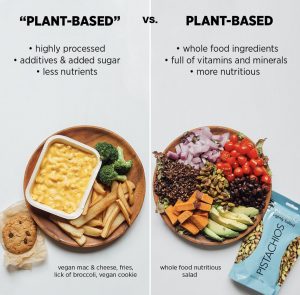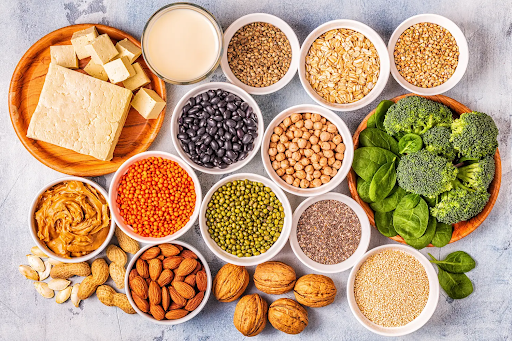Everything About Healthy And Balanced Food: Benefits of Embracing Plant Based Options
The discussion surrounding plant-based diets has acquired substantial focus over the last few years. Lots of people are discovering the possible wellness advantages, nutritional advantages, and ecological influences connected with these dietary choices. As individuals come to be a lot more familiar with their food's influence on well-being and sustainability, inquiries emerge regarding the functionalities of adopting such a way of living. What details modifications can one expect, and just how might these options reshape not just individual health and wellness but additionally the world's future?
Understanding Plant-Based Diets
Many people associate plant-based diet plans mainly with vegetarianism or veganism, these diet regimens can encompass a vast range of consuming patterns that prioritize entire, minimally processed plant foods. Such diet plans frequently consist of fruits, vegetables, whole grains, nuts, beans, and seeds, while restricting or eliminating animal items. This flexibility enables people to tailor their dietary choices according to dietary demands and personal choices. Some might adopt a mostly plant-based diet while still sometimes consuming meat or milk, frequently described as a flexitarian approach. The focus stays on including more plant foods, which can result in a varied selection of flavors and meals. Recognizing these numerous interpretations of plant-based eating is necessary for valuing its accessibility and charm in contemporary food society.
Wellness Conveniences of Plant-Based Foods
The health benefits of plant-based foods are considerable, using a nutrient thickness benefit that sustains general wellness. Research study shows that these foods can boost heart wellness and play an essential role in efficient weight monitoring. By including extra plant-based alternatives, people might boost their nutritional selections and advertise lasting wellness.
Nutrient Thickness Benefit
Nutrient density plays a vital function in the health and wellness benefits of plant-based foods, making them a compelling option for those looking for a well balanced diet. Plant-based foods, such as fruits, veggies, beans, nuts, and entire grains, are frequently rich in important vitamins, minerals, and anti-oxidants while being lower in calories. This high nutrient density enables individuals to consume fewer calories while still satisfying their nutritional requirements. Additionally, these foods are packed with nutritional fiber, advertising digestion health and wellness and assisting in weight monitoring. By integrating nutrient-dense plant-based choices, consumers can boost their general health and wellness, support their body immune systems, and minimize the risk of persistent illness. Eventually, the nutrient density of plant-based foods emphasizes their value in a health-conscious lifestyle.
Heart Health And Wellness Improvement

Weight Management Support
Along with advertising heart health, a plant-based diet regimen can significantly aid in weight monitoring. This dietary approach stresses whole foods such as fruits, veggies, legumes, nuts, and entire grains, which are typically reduced in calories and higher in fiber contrasted to animal-based products. The high fiber material helps boost satiety, minimizing overall calorie consumption. Furthermore, plant-based diet regimens are frequently abundant in vital nutrients while reduced in undesirable fats, making it less complicated to maintain a healthy and balanced weight. Plant Based Chicken. Research indicates that people that adopt a plant-based way of life often tend to have reduced body mass indexes (BMIs) and experience more successful fat burning contrasted to those that consume meat-heavy diet plans. Embracing plant-based choices is a calculated selection for reliable weight management.
Nutritional Worth of Plant-Based Components
Plant-based active ingredients are abundant in essential nutrients, providing a diverse array of vitamins, minerals, and anti-oxidants that add to general wellness. A comparison of healthy protein sources reveals that while animal products are frequently considered as superior, many plant-based alternatives offer sufficient healthy protein and other useful compounds. Recognizing the nutritional worth of these components can help individuals make educated nutritional options.
Essential Nutrients in Plants
Nutrient-rich ingredients found in plants supply a diverse selection of necessary vitamins and minerals that add considerably to overall health and wellness. These ingredients are abundant in vitamins A, C, and K, which sustain immune feature, vision, and blood clotting, respectively. On top of that, plants give essential minerals such as magnesium, potassium, and calcium, important for heart wellness, muscle feature, and bone strength. The visibility of fiber in plant-based foods aids digestion and advertises a healthy intestine microbiome. Anti-oxidants, discovered generously in veggies and fruits, aid fight oxidative stress and lower swelling. In addition, several plant foods are low in calories yet high in nutrients, making them an outstanding option for those seeking to preserve a healthy weight while guaranteeing excellent nutrient consumption.
Comparing Healthy Protein Sources
Protein resources differ substantially in their dietary profiles, with plant-based components providing special benefits. Unlike pet healthy proteins, which frequently include hydrogenated fats and cholesterol, plant proteins tend to be lower in these unhealthy components. Legumes, nuts, seeds, and entire grains are rich in crucial amino acids, fiber, vitamins, and minerals. Lentils provide high healthy protein material alongside substantial iron and folate, while quinoa is a total protein, supplying all 9 important amino acids. Additionally, plant-based healthy proteins are frequently accompanied by anti-oxidants and phytochemicals that support total health and wellness. The shift to plant-based healthy protein sources not just enhances dietary intake yet also lines up with lasting dietary techniques, minimizing environmental influence and promoting long-lasting health advantages.
Environmental Effect of Plant-Based Consuming
As understanding of environment modification expands, many people are exploring sustainable nutritional choices that can substantially reduce their ecological footprint. Plant-based eating has actually become a considerable factor to decreasing greenhouse gas exhausts, which are primarily connected with animals production. The cultivation of fruits, beans, veggies, and grains usually calls for fewer resources, such as water and land, compared to pet farming. In addition, plant-based diets can result in lowered logging, as much less land is needed for grazing livestock or growing animal feed. By moving in the direction of plant-based alternatives, consumers can support biodiversity and promote this article healthier environments. On the get redirected here whole, embracing plant-based eating not only benefits personal health however likewise stands for a crucial step toward environmental sustainability and conservation efforts.
Conquering Common Misconceptions
While many individuals recognize the benefits of a plant-based diet, numerous misconceptions often prevent them from fully welcoming this way of life. A typical belief is that plant-based diets do not have sufficient protein; however, various plant sources, such as beans, nuts, and tofu, provide sufficient protein. In addition, some think that this diet plan is expensive, when in reality, staples like beans, rice, and seasonal veggies can be fairly budget friendly. An additional misunderstanding is that plant-based consuming is extremely restrictive, whereas it really offers a varied selection of tastes and foods. Lastly, numerous stress that a plant-based diet regimen might bring about shortages, yet with appropriate preparation, people can obtain all required nutrients, consisting of minerals and vitamins, while taking pleasure in a vast selection of tasty meals.
Tips for Transitioning to a Plant-Based Way of living
Making the shift to a plant-based way of living can be an enhancing experience, though it often requires some guidance to browse the preliminary modifications. First, individuals are encouraged to begin gradually, including more fruits, vegetables, beans, and entire grains into their meals while lowering meat and dairy products usage. Dish preparation is essential; preparing a regular menu can aid ease the adjustment and protect against last-minute harmful choices. Exploring new dishes and cooking techniques can additionally preserve and improve the experience exhilaration about plant-based eating. Additionally, joining support groups or areas can offer inspiration and share beneficial suggestions. Remaining informed concerning nutrition warranties balanced dishes, avoiding shortages while promoting a healthy and balanced, gratifying plant-based lifestyle.

Delicious Plant-Based Meal Ideas
Checking out tasty plant-based meal ideas can motivate people to embrace an extra nourishing diet plan. One preferred option is a hearty quinoa salad, featuring cherry tomatoes, cucumber, and a tangy lemon-tahini clothing. Another fave is a savory lentil stew, loaded with carrots, celery, and aromatic herbs, best for a calming supper. For breakfast, over night oats made with almond milk, chia seeds, and topped with fresh berries offer a nutritious begin to the day. Additionally, a vibrant vegetable stir-fry with tofu and a selection of vibrant veggies can be a quick yet pleasing dish. Creamy avocado toast on whole-grain bread, sprayed with flavors and seeds, uses a basic yet savory snack. These meals display the range and splendor of plant-based eating.

Often Asked Questions
Can a Plant-Based Diet Offer Enough Healthy Protein?
The inquiry of whether a plant-based diet plan can provide enough protein prevails. Countless resources, including vegetables, nuts, seeds, and whole grains, can fulfill healthy protein needs effectively, supporting a balanced and nourishing diet plan for people.
Are Plant-Based Diet Regimens Suitable for Children?
The viability find more of plant-based diet regimens for children depends upon mindful planning. Sufficient nutrients have to be assured, including minerals, proteins, and vitamins. With proper advice, such diet regimens can sustain healthy and balanced growth and growth in youngsters.
How Do I Eat in restaurants on a Plant-Based Diet?
Eating out on a plant-based diet plan includes looking for dining establishments with diverse menus, requesting for adjustments, and discovering vegan-friendly alternatives. Preparation in advance and communicating dietary choices can improve the dining experience while keeping dietary options.
What Prevail Allergens in Plant-Based Foods?
Common allergens in plant-based foods consist of soy, gluten, nuts, and seeds - Gluten Free BBQ Sauce. Individuals adhering to a plant-based diet plan needs to be mindful of these irritants and review tags very carefully to avoid adverse reactions and assure secure consumption
Can Plant-Based Diets Aid With Weight Loss?
Research study suggests that adopting a plant-based diet regimen might assist in weight-loss as a result of its commonly lower calorie thickness and greater fiber material. This mix can boost satiation, aiding people handle their calorie consumption efficiently. Many people connect plant-based diets generally with vegetarianism or veganism, these diets can incorporate a broad range of consuming patterns that prioritize whole, minimally refined plant foods. Nutrient thickness plays an important duty in the health benefits of plant-based foods, making them a compelling option for those looking for a well balanced diet. Plant-based diet regimens have actually been revealed to noticeably enhance heart wellness, as they typically have aspects that sustain cardiovascular feature. In addition to advertising heart health and wellness, a plant-based diet plan can substantially assist in weight management. An usual idea is that plant-based diet plans lack adequate protein; nonetheless, many plant sources, such as beans, nuts, and tofu, supply sufficient protein.